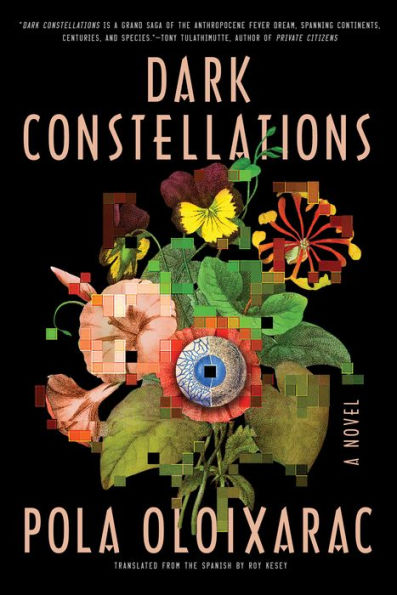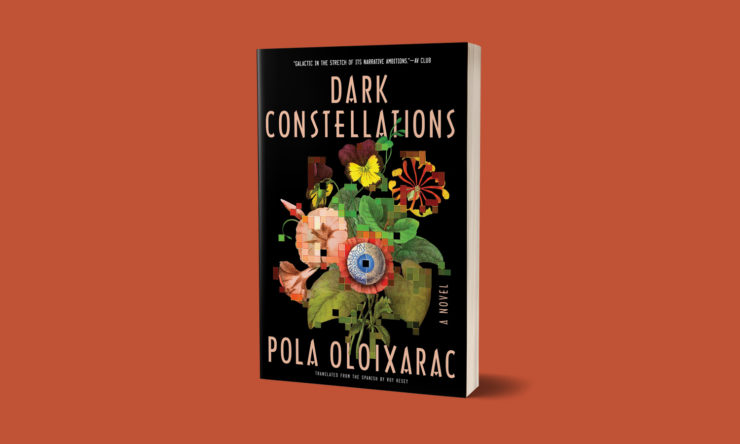A brutal poetry lives in the dark spaces, between the stars, and it is through them that Argentinian writer Pola Oloixarac paints a twisted portent of the future path of the world in her cyberpunk novel, Dark Constellations.
In this book, both tongue-in-cheek and terrifying, translated from the Spanish by Roy Kesey, Oloixarac gives us a surreally terrifying answer to the age-old question of what the next stage of evolution humanity is hurtling toward—the true fusion of human and technology via the ultimate destruction.
Dark Constellations would have already been a hallucination-laced horror story by itself, but when set against the backdrop of the first months of 2020, the ever-spreading COVID-19 disease across the globe and recent news of the stock market cratering along with it, the book takes on an eerie prescience and urgency that has you questioning what is truly fact and what is fiction. (Actually, if you’re not already asking that question constantly, you’re late to the game.)
Buy the Book


Dark Constellations
The story is centered into three overlapping arcs, with Niklas Bruun, a scientific explorer in 1882; Cassio, who’s story begins with his creation and birth in 1983; and Piera, who enters Cassio’s lab as a colleague in 2024. Beginning with Niklas’ Euro-colonial centric gaze during an exploration into the hidden civilization within a volcanic crater in Africa, he describes an unreal experience going from the crater’s dark bottom to the top and encountering a sexual ritual with the natives and the “discovery” of several local plants and insects, amongst other surreal experiences, aided by drinking the vision-inducing milk of white butterflies. However, upon his return to Europe, With his journal and sketches, Niklas helps usher in “the birth of a golden monster in the competitive world of botany” via his recounting and sets himself on the path for what he views as a higher calling in his scientific career.
Thus we enter into the end of the twentieth century. If the “The Matrix” in 1999 gave us Agent Smith’s notorious “humans are a virus” soliloquy, then Oloixarac builds upon it with her main protagonist, Cassio, a hacker of extraordinary intellect and feverish intention, born in 1983 to the privileged, blonde and incurious Argentinian Sonia and the Black Brazilian aeronautical engineer João Fernando Brandão da Silva.
Cassio slips into the world already in a liminal state with his mixed heritage and a namesake encompassing the constellation Cassiopeia, also a Greek queen who committed hubris, and Caesar’s lead betrayer, Cassius. Adding in his self-proclaimed nerdy leanings, Cassio’s trajectory is already heavy with foreshadowing. As a pre-teen, he throws himself into the new universe of binary code via computer games, breaking into every major network he can find with a the furious moral clarity that can only come from a budding narcissist. When his inevitable adolescent rejection by a girl leads him to render the opposite gender invisible, it fuels his passion to create technological viruses to infiltrate as many systems as he can.
The hacking world, like Niklas’ subterranean tunnels beneath the volcanic crater, is submerged in the darkness of anonymity and twisty pathways, where the strong eat the strong. It is, of course, overtly masculine and bursting with Latin American machismo culture, akin to Silicone Valley. Oloixarac lays it on thick, stripping her female characters of any depth or meaning beyond how they can serve the males. For any third-wave feminist reader, such as myself, it’s extremely jarring, her male characters’ viewpoints like sandpaper against the nerves.
That said, she gives virtually no commentary on the colorist racial dynamics of South America as we follow Cassio from one decade to the next, a big omission considering how surgically she eviscerates cishet males. However, references to the Indigenous communities of Argentina and Brazil are, hopefully purposefully, cringe-worthy (at one point, Cassio works for a start-up tech company that made a popular game where the object was “throwing endangered natives around”). It’s possible something of the tone is lost in the translation from Spanish to English.
What propels Cassio and Niklas through the separate decades into their next centuries is that most patriarchal of urges, to attain an epic discovery that leaves their names written in all-caps throughout history, human or otherwise.
Where Niklas finds himself in the Amazon, sucked into another darkly surreal scene, doing the bidding of a self-made deity, Hoichi, taking the form of a six-foot-tall rat holding forth in the jungle like a Kafka-esque Kurtz, Cassio teams up with a fellow former hacker’s laboratory in 2024 to mine and categorize all the human genetic data captured on the streets by biosensors.
Thus we meet Piera, our last protagonist and, as all women in the book, peripheral but vital. It is through her, as yet another vessel who fades away after her usefulness is served, that Cassio is able to commit the ultimate atrocity of his genius—to turn a computer virus into a living being.
As Hoichi says upon Niklas meeting him, “Everything can become something else,” and as Cassio’s boss, Max Lambard, says before Cassio’s own climatic breakthrough: “We live in an era so demon-possessed that all we can do is practice goodness and justice from a position of deep clandestinity. We’ve gone so far into the darkness that there’s no separating it from us.”
Oloixarac uses her hypnotic prose and wildly original ideas to eviscerate the deep misogyny that makes up the scientific and technological worlds, sending us on a wild ride through a world where everything is transmutable.
This is not a book for the faint of heart but one that not only captures the imagination, sinks it wholly into the darkness and lets it reemerge utterly transformed.
Dark Constellations is available from Penguin Random House.
Angela Maria Spring is the owner of Duende District, a mobile boutique bookstore by and for people of color, where all are welcome. She holds an M.F.A. in poetry from Sarah Lawrence College, was a 2018 Kirkus Fiction Prize judge, and has work forthcoming in Radar Poetry, Pilgrimage, Borderlands: Texas Poetry Review, and Third Wednesday. You can find her on Twitter at @BurquenaBoricua or at duendedistrict.com.










